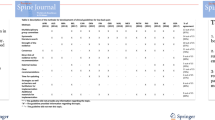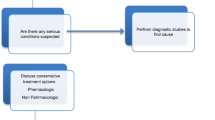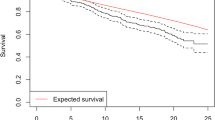Abstract
Purpose
To identify the relationship between depression measured by Zung depression rating scale (ZDRS) and postoperative outcomes (including the patients reported outcomes [PRO] and clinical outcomes) two years after short-segment fusion surgery for degenerative lumbar spinal disease in older patients (aged 75 years and older).
Methods
We enrolled patients who underwent short-segment fusion surgery for lumbar degenerative disease from May 2018 to June 2020. All patients were assessed for depression using the ZDRS. Patients were included in the depression group and not-depressed group based on their scores. Preoperative baseline data were collected on characteristics, comorbidities, laboratory data, pain levels (visual analogue scale [VAS]), functional status (Oswestry Disability Index [ODI]), and surgery-related variables. The primary outcomes were PRO measures, including VAS, ODI and satisfaction two years after lumbar fusion surgery. Other outcomes included postoperative complications, the length of stay, and reoperation. Univariate and multivariate analyses were performed to identify the risk factors for poor satisfaction.
Results
A total of 231 patients (201 in not-depressed and 30 in depressed group) were enrolled in this study. There were no significant differences between the two groups for baseline data. Depressed group had higher rates of choices for dissatisfaction (36.7% vs. 14.0%, p = 0.015), higher VAS scores of low back pain (2.8 ± 2.3 vs. 1.6 ± 1.7, p = 0.012), and worse functional status (31.5 ± 22.5 vs 21.8 ± 19.9, p = 0.015) than the not-depressed group. Depressed patients reported significantly higher rates of postoperative complications and readmissions. Multivariate regression analysis revealed that depression (p = 0.001) was independently associated with postoperative dissatisfaction.
Conclusion
Preoperative depression was a risk factor for postoperative dissatisfaction, worse functional status, readmission, and complications in older patients undergoing lumbar fusion surgery. Preoperative screening using the Zung depression scale helps inform decision-making when considering fusion surgery for patients aged 75 and older.





Similar content being viewed by others
Availability of data and materials
The underlying data supporting the results of this study could be obtained by contacting the corresponding author.
References
Kok RM, Reynolds CF (2017) Management of depression in older adults a review. Jama-J Am Med Assoc 317:2114–2122. https://doi.org/10.1001/jama.2017.5706
Luppa M, Sikorski C, Luck T, Ehreke L, Konnopka A, Wiese B et al (2012) Age- and gender-specific prevalence of depression in latest-life - systematic review and meta-analysis. J Affect Disord 136:212–221. https://doi.org/10.1016/j.jad.2010.11.033
Anstey KJ, von Sanden C, Sargent-Cox K, Luszcz MA (2007) Prevalence and risk factors for depression in a longitudinal, population-based study including individuals in the community and residential care. Am J Geriatr Psychiatr 15:497–505. https://doi.org/10.1097/JGP.0b013e31802e21d8
Wong SY, Mercer SW, Woo J, Leung J (2008) The influence of multi-morbidity and self-reported socio-economic standing on the prevalence of depression in an elderly Hong Kong population. BMC Public Health. https://doi.org/10.1186/1471-2458-8-119
Pakpour AH, Nikoobakht M, Campbell P (2015) Association of pain and depression in those with chronic low back pain the mediation effect of patient sexual functioning. Clin J Pain 31:44–51. https://doi.org/10.1097/ajp.0000000000000076
Snekkevik H, Eriksen HR, Tangen T, Chalder T, Reme SE (2014) Fatigue and depression in sick-listed chronic low back pain patients. Pain Med 15:1163–1170. https://doi.org/10.1111/pme.12435
Becker P, Bretschneider W, Tuschel A, Ogon M (2010) Life quality after instrumented lumbar fusion in the elderly. Spine 35:1478–1481. https://doi.org/10.1097/BRS.0b013e3181c62294
Rodgers WB, Gerber EJ, Rodgers JA (2010) Lumbar fusion in octogenarians the promise of minimally invasive surgery. Spine 35:S355–S360. https://doi.org/10.1097/BRS.0b013e3182023796
Kim HC, An SB, Jeon H, Kim TW, Jae Keun O, Shin DA, Yi S, Kim KN, Lee PH, Kang SY, Ha Y (2021) Preoperative cognitive impairment as a predictor of postoperative outcomes in elderly patients undergoing spinal surgery for degenerative spinal disease. J Clin Med 10(7):1385. https://doi.org/10.3390/jcm10071385
Miller JA, Derakhshan A, Lubelski D, Alvin MD, McGirt MJ, Benzel EC et al (2015) The impact of preoperative depression on quality of life outcomes after lumbar surgery. Spine J 15:58–64. https://doi.org/10.1016/j.spinee.2014.06.020
Stull JD, Divi SN, Goyal DKC, Bowles DR, Reyes AA, Bechay J et al (2020) Preoperative mental health component scoring Is related to patient reported outcomes following lumbar fusion. Spine 45:798–803. https://doi.org/10.1097/brs.0000000000003399
Jackson KL, Rumley J, Griffith M, Agochukwu U, DeVine J (2020) Correlating psychological comorbidities and outcomes after spine surgery. Global Spine Journal 10:929–939. https://doi.org/10.1177/2192568219886595
Khan JM, Basques BA, Harada GK, Louie PK, Chen I, Vetter C et al (2020) Does increasing age impact clinical and radiographic outcomes following lumbar spinal fusion? Spine J 20:563–571. https://doi.org/10.1016/j.spinee.2019.11.003
Phan K, Kim JS, Somani S, Di Capua J, Kim R, Shin J et al (2018) Impact of age on 30-day complications after adult deformity surgery. Spine 43:120–126. https://doi.org/10.1097/brs.0000000000001832
Dunstan DA, Scott N, Todd AK (2017) Screening for anxiety and depression: reassessing the utility of the Zung scales. BMC Psychiat. https://doi.org/10.1186/s12888-017-1489-6
Adogwa O, Parker SL, Shau DN, Mendenhall SK, Bydon A, Cheng JS et al (2013) Preoperative Zung depression scale predicts patient satisfaction independent of the extent of improvement after revision lumbar surgery. Spine J 13:501–506. https://doi.org/10.1016/j.spinee.2013.01.017
Charlson ME, Pompei P, Ales KL (1987) Diseases CRMJJoc. A new method of classifying prognostic comorbidity in longitudinal studies: development and validation. 40:373-83. https://doi.org/10.1016/0021-9681(87)90171-8
Thurber S, Snow M, Honts CR (2002) The zung self-rating Depression scale: convergent validity and diagnostic discrimination. Assessment 9:401–405. https://doi.org/10.1177/1073191102238471
Mummaneni PV, Bydon M, Alvi MA, Chan AK, Glassman SD, Foley KT et al (2019) Predictive model for long-term patient satisfaction after surgery for grade I degenerative lumbar spondylolisthesis: insights from the quality outcomes database. Neurosurg Focus 46(5):E12. https://doi.org/10.3171/2019.2.FOCUS18734
Stewart WF, Ricci JA, Chee E, Hahn SR, Morganstein D (2003) Cost of lost productive work time among US workers with depression. Jama-J Am Med Assoc 289:3135–3144. https://doi.org/10.1001/jama.289.23.3135
Carreon LY, Djurasovic M, Dimar JR, Kirk Owens R, Crawford CH et al (2016) Can the anxiety domain of EQ-5D and mental health items from SF-36 help predict outcomes after surgery for lumbar degenerative disorders? J Neurosurg: Spine 25(3):352–356. https://doi.org/10.3171/2016.2.SPINE151472
Zhou Y, Deng J, Yang M, Yvang Chang Yu, Zhang GX et al (2021) Does the preoperative depression affect clinical outcomes in adults with following lumbar fusion?: a retrospective cohort study. Clin Spine Surg: A Spine Pub 34(4):E194–E199. https://doi.org/10.1097/BSD.0000000000001102
Zakaria HM, Mansour TR, Telemi E, Asmaro K, Macki M, Bazydlo M et al (2019) Use of patient health questionnaire-2 scoring to predict patient satisfaction and return to work up to 1 year after lumbar fusion: a 2-year analysis from the michigan spine surgery improvement collaborative. J Neurosurg-Spine 31:794–801. https://doi.org/10.3171/2019.6.Spine1963
Levin JM, Winkelman RD, Smith GA, Tanenbaum JE, Benzel EC, Mroz TE et al (2017) Impact of preoperative depression on hospital consumer assessment of healthcare providers and systems survey results in a lumbar fusion population. Spine 42:675–681. https://doi.org/10.1097/brs.0000000000002101
Reme SE, Tangen T, Moe T, Eriksen HR (2011) Prevalence of psychiatric disorders in sick listed chronic low back pain patients. Eur J Pain 15:1075–1080. https://doi.org/10.1016/j.ejpain.2011.04.012
Shah I, Wang C, Jain N, Formanek B, Buser Z, Wang JC (2019) Postoperative complications in adult spinal deformity patients with a mental illness undergoing reconstructive thoracic or thoracolumbar spine surgery. Spine J 19:662–669. https://doi.org/10.1016/j.spinee.2018.10.003
Fineberg SJ, Nandyala SV, Marquez-Lara A, Oglesby M, Patel AA, Singh K (2013) Incidence and risk factors for postoperative delirium after lumbar spine surgery. Spine 38:1790–1796. https://doi.org/10.1097/BRS.0b013e3182a0d507
Susano MJ, Scheetz SD, Grasfield RH, Cheung D, Xu XL, Kang JD et al (2019) Retrospective analysis of perioperative variables associated with postoperative delirium and other adverse outcomes in older patients after spine surgery. J Neurosurg Anesthesiol 31:385–391. https://doi.org/10.1097/ana.0000000000000566
Mancuso CA, Duculan R, Craig CM, Girardi FP (2018) Psychosocial variables contribute to length of stay and discharge destination after lumbar surgery independent of demographic and clinical variables. Spine 43:281–286. https://doi.org/10.1097/brs.0000000000002312
Akins PT, Harris J, Alvarez JL, Chen YX, Paxton EW, Bernbeck J et al (2015) Risk factors associated with 30-day readmissions after instrumented spine surgery in 14,939 patients 30-day readmissions after instrumented spine surgery. Spine 40:1022–1032. https://doi.org/10.1097/brs.0000000000000916
Parker SL, Godil SS, Zuckerman SL, Mendenhall SK, Devin CJ, McGirt MJ (2015) Extent of preoperative depression is associated with return to work after lumbar fusion for spondylolisthesis. World Neurosurgery 83:608–613. https://doi.org/10.1016/j.wneu.2014.12.018
Wahlman M, Hakkinen A, Dekker J, Marttinen I, Vihtonen K, Neva MH (2014) The prevalence of depressive symptoms before and after surgery and its association with disability in patients undergoing lumbar spinal fusion. Eur Spine J 23:129–134. https://doi.org/10.1007/s00586-013-2896-0
Rahman R, Ibaseta A, Reidler JS, Andrade NS, Skolasky RL, Riley LH et al (2020) Changes in patients’ depression and anxiety associated with changes in patient-reported outcomes after spine surgery. J Neurosurg-Spine 32:871–890. https://doi.org/10.3171/2019.11.Spine19586
Whitmore RG, Stephen JH, Vernick C, Campbell PG, Yadla S, Ghobrial GM et al (2014) ASA grade and charlson comorbidity Index of spinal surgery patients: correlation with complications and societal costs. Spine J 14:31–38. https://doi.org/10.1016/j.spinee.2013.03.011
Shinonara K, Ugawa R, Arataki S, Nakahara S, Takeuchi K (2021) Charlson comorbidity index is predictive of postoperative clinical outcome after single-level posterior lumbar interbody fusion surgery. J Orthop Surg Res. https://doi.org/10.1186/s13018-021-02377-7
Hopkins BS, Patel MR, Yamaguchi JT, Cloney MB, Dahdaleh NS (2019) Predictors of patient satisfaction and survey participation after spine surgery: a retrospective review of 17,853 consecutive spinal patients from a single academic institution. Part 1: Press Ganey. J Neurosurg: Spine 30(3):382–388. https://doi.org/10.3171/2018.8.SPINE18594
Connolly J, Javed Z, Raji MA, Chan W, Kuo YF, Baillargeon J (2017) Predictors of long-term opioid use following lumbar fusion surgery. Spine 42:1405–1411. https://doi.org/10.1097/brs.0000000000002133
Macki M, Alvi MA, Kerezoudis P, Xiao S, Schultz L, Bazydlo M et al (2020) Predictors of patient dissatisfaction at 1 and 2 years after lumbar surgery. J Neurosurg-Spine 32:373–382. https://doi.org/10.3171/2019.8.Spine19260
Koster A, Bosma H, Kempen G, Penninx B, Beekman ATF, Deeg DJH et al (2006) Socioeconomic differences in incident depression in older adults: The role of psychosocial factors, physical health status, and behavioral factors. J Psychosom Res 61:619–627. https://doi.org/10.1016/j.jpsychores.2006.05.009
Soriano JC, Revuelta MS, Fuente MF, Diaz IC, Urena PM, Meneses RD (2010) Predictors of outcome after decompressive lumbar surgery and instrumented posterolateral fusion. Eur Spine J 19:1841–1848. https://doi.org/10.1007/s00586.010.1284.2
Acknowledgements
Not applicable.
Funding
This research received grant from Beijing Municipal Medical Research Institute Public Welfare Development and Reform Pilot Project [grant number jingyiyan2019-2]. The sponsor had no role in the design or conduct of this research.
Author information
Authors and Affiliations
Contributions
SKW and SBL contributed to the conception of the study. PC made an important contribution to the revision of the manuscript. DFW and PW contributed significantly to analysis and manuscript preparation. SKW and CK performed the data analyses and wrote the manuscript; CK and SBL helped perform the analysis with constructive discussions. SKW, PC, and DFW contribute equally to this work.
Corresponding author
Ethics declarations
Conflict of interest
The authors declare that there are no conflicts of interest in this work.
Consent for publication
Written informed consent for publication of their clinical details and clinical images were obtained from the patient/parent/guardian/relative of the patient.
Ethical approval
This study was approved by the ethical review committee of Xuanwu Hospital, Capital Medical University. Informed consent was obtained from all subjects and/or their legal guardian(s). All methods were carried out in accordance with relevant guidelines and regulations.
Additional information
Publisher's Note
Springer Nature remains neutral with regard to jurisdictional claims in published maps and institutional affiliations.
Rights and permissions
Springer Nature or its licensor (e.g. a society or other partner) holds exclusive rights to this article under a publishing agreement with the author(s) or other rightsholder(s); author self-archiving of the accepted manuscript version of this article is solely governed by the terms of such publishing agreement and applicable law.
About this article
Cite this article
Wang, SK., Cui, P., Wang, DF. et al. Preoperative Zung depression scale predicts outcomes in older patients undergoing short-segment fusion surgery for degenerative lumbar spinal disease. Eur Spine J 32, 718–726 (2023). https://doi.org/10.1007/s00586-022-07497-0
Received:
Revised:
Accepted:
Published:
Issue Date:
DOI: https://doi.org/10.1007/s00586-022-07497-0




